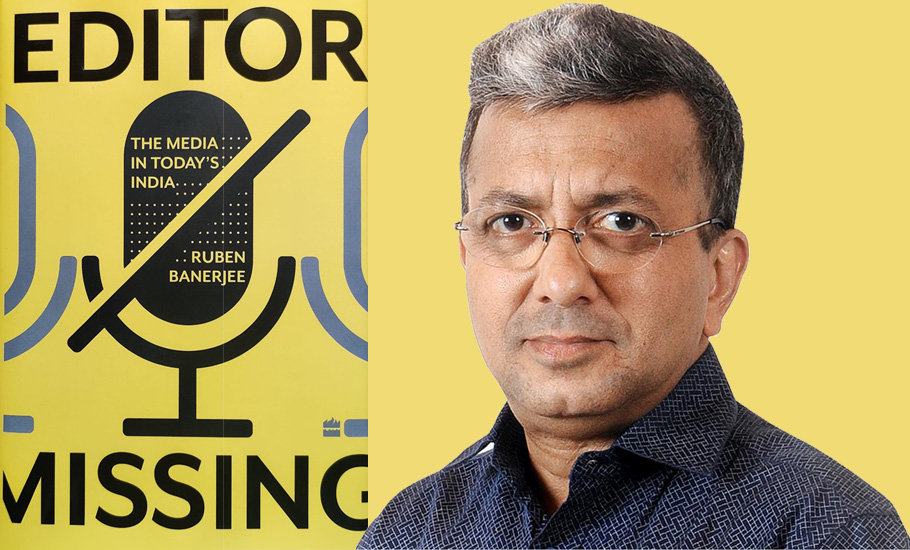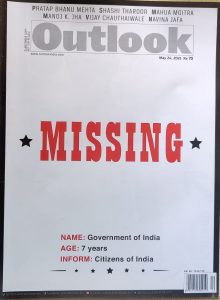
Ex-Outlook Editor narrates tale of sacking in book ominous for India’s media
The book does not confine itself to the events leading to Ruben Banerjee’s exit from the top editorial job at Outlook, but raises larger questions about the way the media is fashioned in this country

When Ruben Banerjee as Outlook Group Editor-in-Chief, along with his team, thought of a magazine cover that loudly proclaimed the absence of the government during the deadly COVID second wave, little did the journalist realise that he was writing his own epitaph as editorial head of the magazine.

The cover, dated May 24, 2021, simply said “Missing”. It went on to ask citizens if they had any idea of the whereabouts of the Union government. Way beyond his expectation, he had struck a raw nerve in the echelons of power. Soon, Banerjee’s comfortably ensconced chair wobbled and, before long, he fell out of the gaddi.
Now, what are the various things that an out-of-job Editor can do? He can look for another job, float his own media company, retire if he’s old enough, or do the most obvious – write a book. After all, he had himself become News. The result: Editor Missing – The Media in Today’s India.
Leaving no room for speculation on why he quit, or forced to quit abruptly, Banerjee lays bare the grisly sequence of events that led to his exit from the popular Outlook magazine.
Intrinsically transient job
Banerjee is not the first to go in the manner he did. There is a long list of honourable editors who have at various times been shown the door by media owners for a variety of reasons – some professional and others personal. As you read the book, and the part which documents in detail (including internal mails that back his claims of being eased out), you realise yet again that the job of an editor who tries to be professional and independent is intrinsically transient. One minute you have a job, the next moment you don’t. All because you attempted to present the truth, unvarnished.
The COVID second wave, as no one needs reminding, was deadly. There was hardly a single family across the country that was spared the ordeal. The fortunate ones went up to the ICU stage and returned, with patches in the lungs, while the ill-fated could not make it alive. Yes, it was a deadly virus that held the world by the scruff of its neck.
Also read: Lifting the media veil: Why TRAI, MIB are interested in media and cross-media ownership again
But in a country like India, poor governance, mismanagement and a creaky health infrastructure meant thousands could not get life-giving oxygen. Bodies floated down the Ganges, long lines of traumatised families waited outside crematoriums for their dear ones to be consigned to flames while the government appeared to be in a state of paralysis or, more figuratively, “missing in action”.
Banerjee, who along with his family, was also hit by the coronavirus, somehow escaped the worst. In the role of an editor, especially of a frontline national magazine, the obvious story was the raging second wave. He and his team decided to take the issue head on. The result was the cover story headlining the “Missing” government.
The 237-page book, published by Harper Collins, explains in detail the reasoning behind the “Missing” cover, the internal discussions in the newsroom and the effort to examine threadbare, the collapse of governance and the expose of a dysfunctional healthcare system. Banerjee, a firm proponent of “all sides journalism”, afforded generous space for the ruling dispensation to give its point of view, in the interest of fairness.
Media and other businesses
The book does not confine itself to the events leading to Banerjee’s exit from the top editorial job at Outlook, but raises larger questions about the way the media is fashioned in this country. Owners of most media companies have interests in other businesses and that becomes a liability when the time comes to take a sensitive editorial call. Especially when it goes against the government.
Watch: Restraint is empowerment, says The Hindu’s former Reader’s Editor
For students and practitioners of journalism, Banerjee’s book offers valuable insights into the journey of an ordinary middle-class youngster who struggles to get his first break in the profession and gradually makes it to the top of the heap – his path littered with amusing, nay, hilarious incidents including one where he is asked to get tea when he meets an elderly journalist for a job. He doesn’t, incidentally, despite the tea.
Lest one gets the impression that the book is dark, mysterious, full of conspiratorial machinations to dislodge an editor, that is not entirely the case. An engaging raconteur, Banerjee, despite all that he has experienced, manages to offer hope to the young wanting to make a mark in journalism.
For, if there is one thing in the profession, unlike many others, it is that one need not necessarily come from a pedigreed background, an influential family or have a godfather in journalism to be successful. The work and commitment to the profession is enough to work wonders for anyone wanting to make a mark as a journalist.
Unpredictability of journalism
Of course, all is not rosy or ideal. If genuine journalism is practised, sooner or later, it will invariably lead to a situation where the establishment will have to be challenged. At this point the carefully laid plans of a journalist can fall by the wayside, as has happened in Banerjee’s case.
Few professions can match the unpredictability (both positive and negative) of journalism. From reporting out of Orissa, Banerjee, one sunny morning, was yanked out of Bhubaneswar only to find himself in Doha, Qatar, as part of the team that launched the English language version of Al-Jazeera (where he and this reviewer were colleagues).
The book captures the sudden shift from the “back of beyond” to the “frontlines of journalism”, on the eve of the United States’ invasion of Iraq in 2003. Banerjee returned more than a decade later to Delhi with a bagful of memorable experiences of the international variety – but, as it turned out, nothing to beat what finally happened to him at Outlook.
Editor Missing – The Media in Today’s India
By Ruben Banerjee
Published by HarperCollins
Pages: 237; Price: Rs 599

